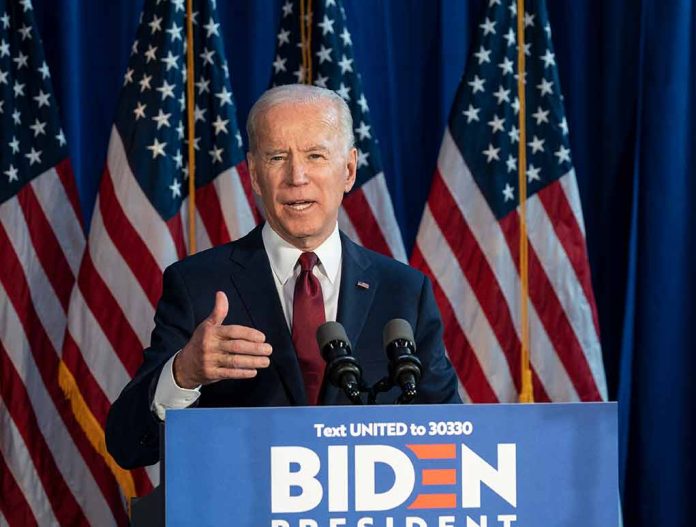
In the dying embers of the Obama administration, Joe Biden is racing against time to solidify key policies before power shifts to Donald Trump.
At a Glance
- Efforts to preserve the Obama administration’s legacy are underway as the Trump transition approaches.
- Biden focuses on health, environment, and education reforms to safeguard their achievements.
- Foreign and domestic policies face challenges as Trump prepares to assume office.
- The administration is acting swiftly to ensure the continuation of initiatives beyond Biden’s term.
Solidifying Key Policies
Joe Biden and his team are advocating for sustainable policy initiatives, notably those around infrastructure, healthcare reform, and environmental preservation. An idea emerges that with Biden’s tenure concluding, we observe his urgent push to ensure continuity of efforts that set the foundation during the Obama administration. The estimated $3.4 billion allotted for transportation highlights a priority in economic strengthening and infrastructure improvement.
Critics argue that Biden’s urgency reflects desperation to cement Obama’s legacy, which many conservatives view as overly regulatory and economically burdensome.
Biden’s policies have been fast-tracked, from environmental measures to loans aimed at bolstering electric vehicle production. With EPA deadlines and fees for methane emissions coming to the forefront, the administration strives to implement impactful environmental strides. The Energy Department’s $544 million loan signifies an investment in a cleaner future.
Conservatives caution that such rapid implementation risks alienating key industries, such as fossil fuels, which are vital to energy independence and job creation.
Foreign Policy and Challenges
Foreign affairs have been a cornerstone of Joe Biden’s vice-presidential role. Efforts in the Middle East and Ukraine have drawn international attention, though not without complications. The administration prepares for the new presidency, aware of the changes Trump might introduce. Oleksandr Merezhko, a member of Ukraine’s parliament, observes, “I think that now Biden can be much more decisive in support of Ukraine, especially when he sees that Trump will be the next president.”
Conservatives, however, question whether Biden’s foreign policy has prioritized Ukraine’s interests over America’s, arguing that taxpayer-funded aid could be better spent addressing domestic challenges.
Amid growing anticipation over Trump’s position, Biden’s decisive steps in Ukraine reflect the administration’s urgency. Resources are being channeled efficiently, from defense contractors to aid disbursement, to fortify Ukraine’s stance. Nevertheless, European allies redirect attention to influence Trump, acknowledging the high stakes and potential shifts in strategic partnerships.
Some on the right see Biden’s rush to act as an attempt to undermine Trump’s incoming administration, potentially complicating the new president’s ability to chart a clear foreign policy direction.
Legacy and Domestic Plan
With the impending administration change, Biden’s domestic focus converges on educational reform and climate law adherence. The proposed student loan forgiveness rules face potential legal challenges. Yet, the administration remains committed to expediting loan cancellation for affected individuals. A strong emphasis is placed on continual climate law funding, underscoring a lasting commitment to sustainable progress.
Opponents argue that these moves are more about securing progressive votes than crafting effective, long-term solutions, with many viewing student loan forgiveness as unfair to taxpayers who didn’t borrow or already paid their debts.
Biden calls for urgency: “Let’s make every day count.” The administration races to spend defense fund allocations for Ukraine assistance and advance green initiatives. The legislature’s action for judge confirmations complements the broader strategy to ensure Biden’s influence endures, even as Europe grapples with new diplomatic landscapes.
Conservatives assert that Biden’s rush undermines legislative oversight, calling into question the long-term sustainability of his initiatives.
As the transition of power approaches, Donald Trump and his incoming administration present a notably different vision for America’s future. Trump’s supporters argue that the policies of the Obama-Biden era have stifled economic growth and prioritized global interests over domestic concerns. They view the shift as an opportunity to undo regulations they see as burdensome, particularly in energy and business sectors.
With promises of “America First” policies, Trump’s team plans to recalibrate foreign alliances, reinvigorate traditional energy industries, and streamline government programs to better serve American workers. For Trump’s base, this transition signals a chance to prioritize prosperity and reclaim the direction of the country.








